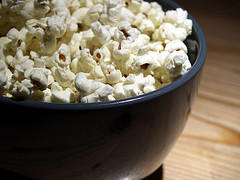You know popcorn as the accompaniment to your movie-going experience, but have you ever stopped to ponder what causes popcorn to pop? There's actually a science behind this light and puffy snack, and it starts with the water content of each individual popcorn kernel.
Within each protective hull of popcorn, there's a small amount of moisture—13.5% to 14% by mass, to be exact. (Any more or less, and the popcorn won't pop.) As the kernel is heated, the water begins to expand, creating steam. Once the pressure inside the kernel reaches 135 pounds per square inch (around 350 degrees Fahrenheit), the kernel's protective hull finally gives way, turning the kernel inside out and exposing the kernel's starchy endosperm. This soft starch rapidly expands, then immediately cools, resulting in popcorn's unique irregular shape.
That said, not any old corn can be used for popcorn. Only zea mays everta, a particular strain of cultivated corn, can make popcorn.
What Makes Popcorn Pop? [The Popcorn Board]
What Makes Popcorn Pop? [Mental Floss]
How Does Popcorn Pop? [Human Touch of Chemistry]

 Equal Housing Opportunity
Equal Housing Opportunity